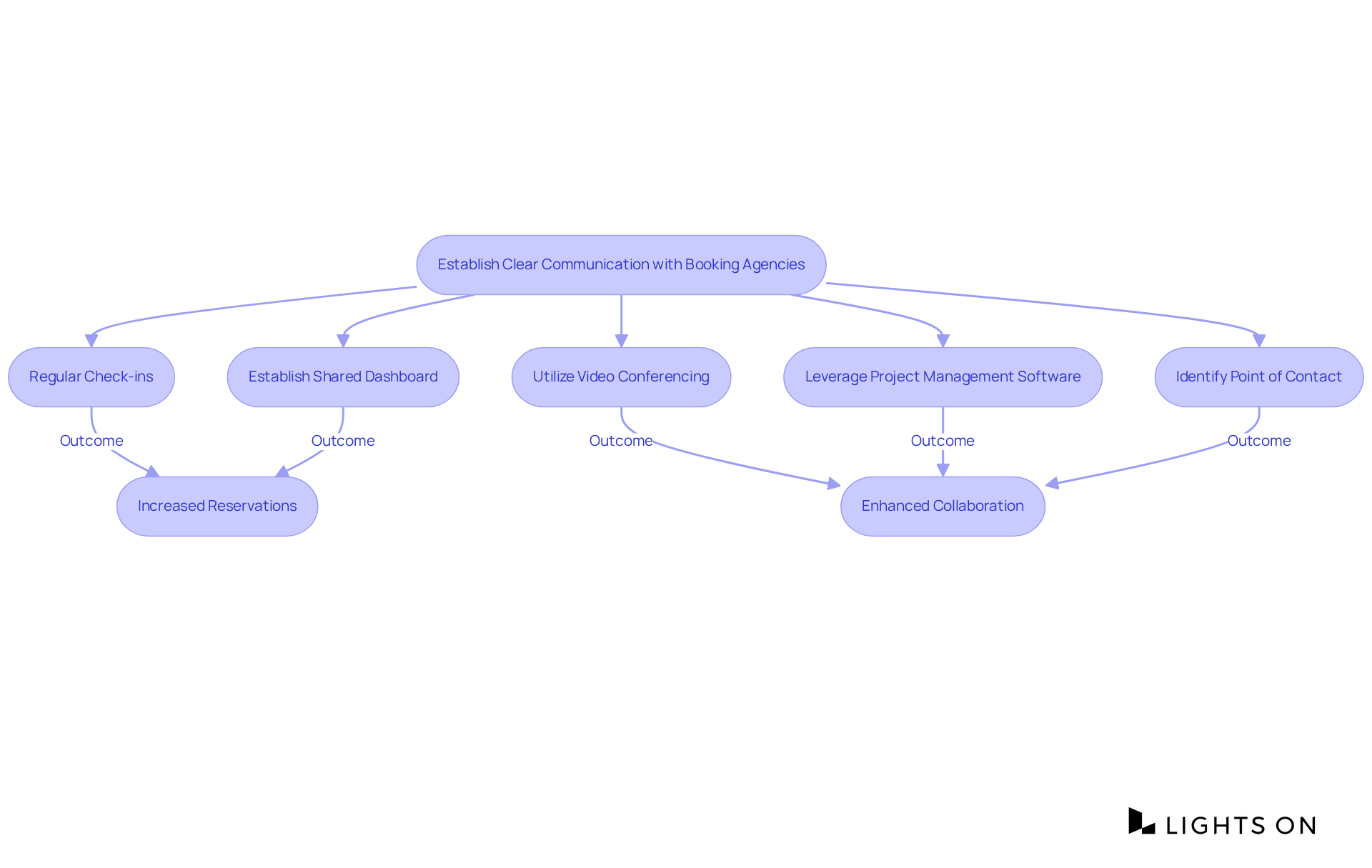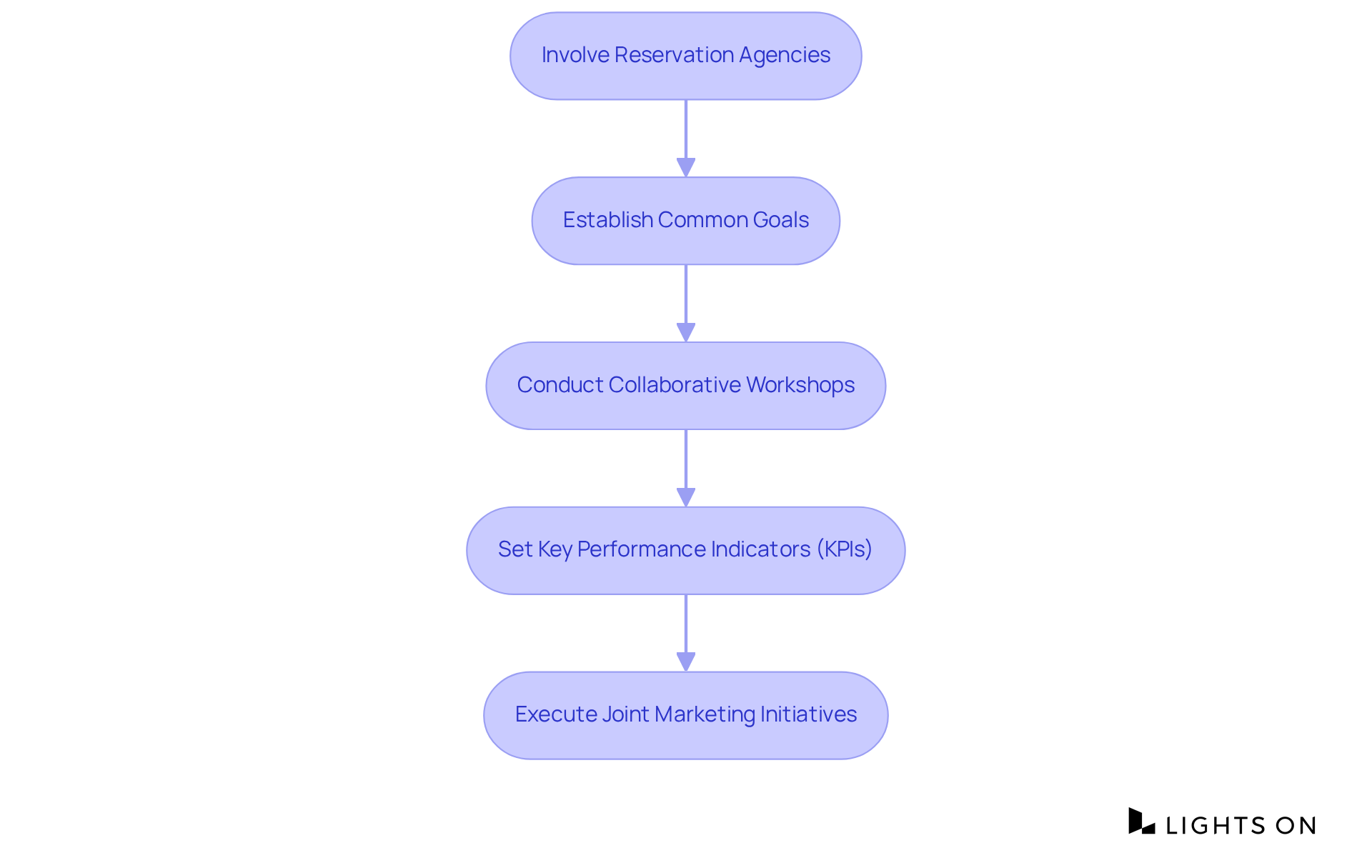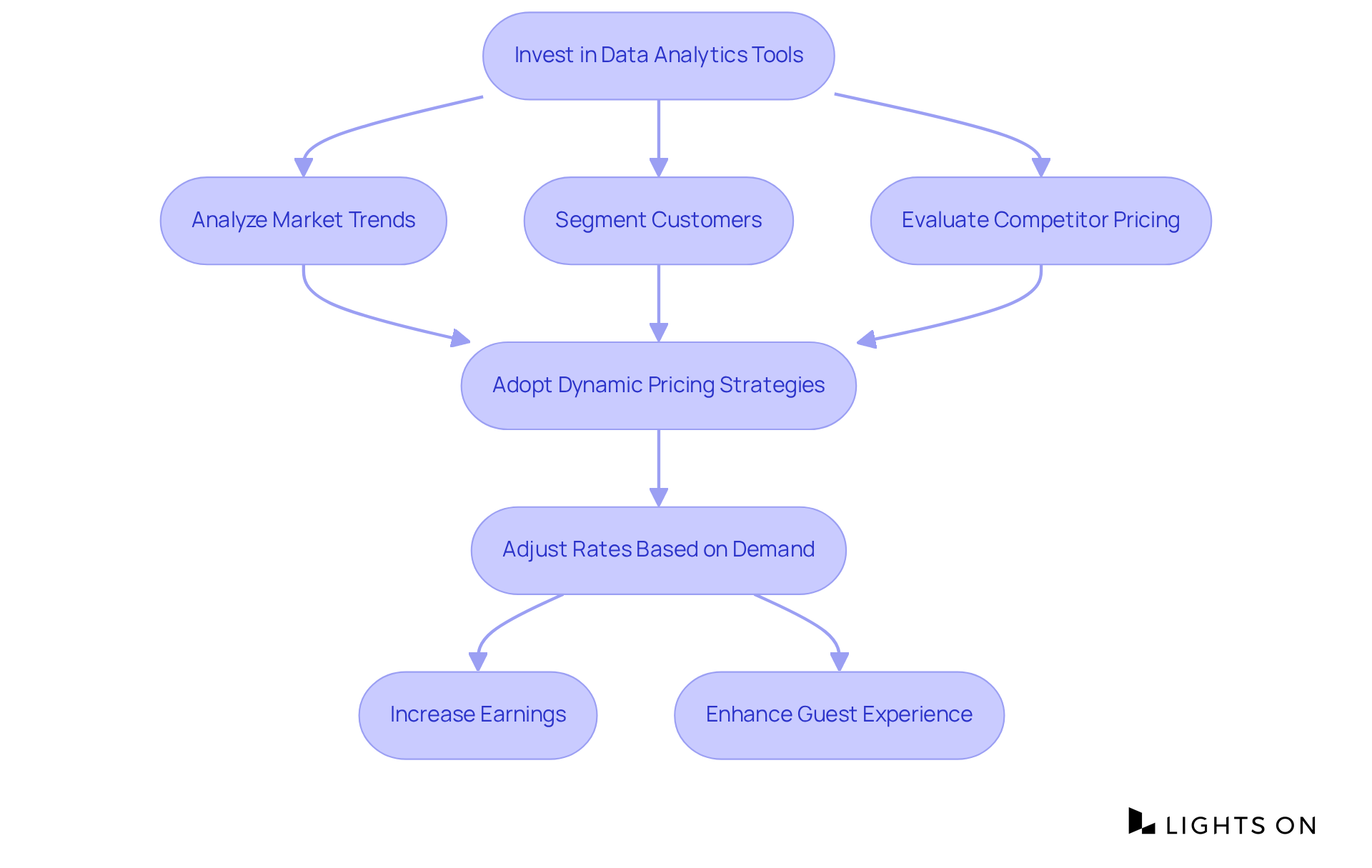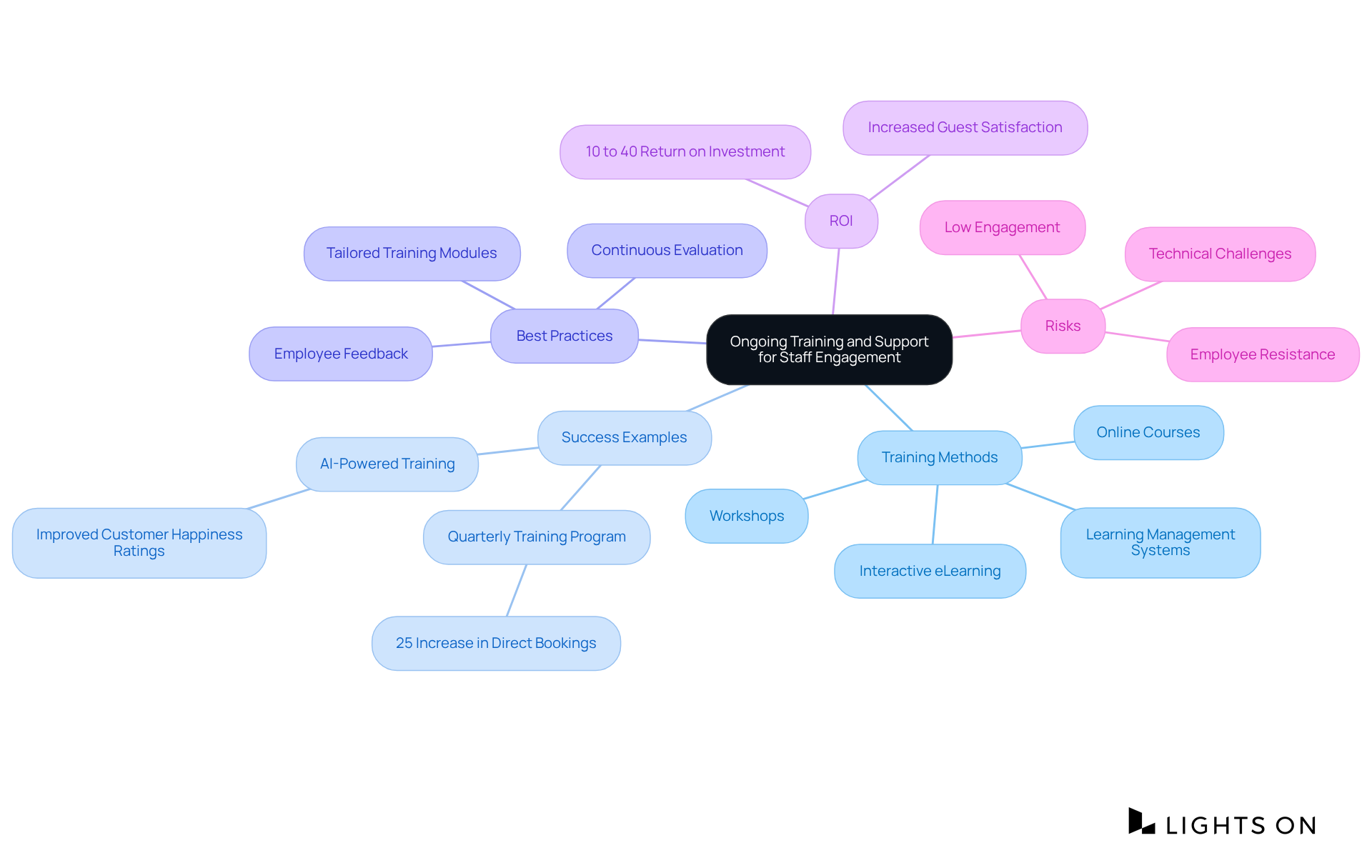This article delineates four pivotal strategies for hotels aiming to collaborate effectively with booking agencies:
Each strategy is underpinned by compelling examples and evidence that illustrate how proactive communication, shared objectives, data-driven pricing, and comprehensive staff training can culminate in heightened reservations and enhanced revenue outcomes for hotels.
Navigating the complex landscape of hotel booking agencies is a critical factor for establishments aiming to maximize their occupancy and revenue. This challenge necessitates the implementation of strategic practices, enabling hotels to cultivate fruitful partnerships that enhance communication and align goals for mutual success. However, the difficulty lies in effectively bridging the gap between agency expectations and hotel capabilities. Thus, the question arises: how can hotels leverage these partnerships to drive both immediate bookings and long-term growth?
To foster with booking agencies for hotels, establishments must prioritize regular check-ins, leveraging tools such as video conferencing and project management software. Establishing a shared dashboard facilitates real-time updates on performance metrics, enabling both parties to monitor progress and make informed decisions. Furthermore, identifying a specific point of contact within the establishment for the agency streamlines communication, enhancing responsiveness to inquiries and issues. This proactive approach not only builds trust but also promotes more effective collaboration with booking agencies for hotels, ultimately leading to increased reservations and revenue.
For instance, an establishment that instituted weekly planning sessions with booking agencies for hotels experienced a remarkable 20% increase in direct reservations within just three months, as both teams effectively coordinated their marketing initiatives. However, accommodations must remain vigilant against common pitfalls, such as inconsistent communication and delayed responses to agency inquiries, which can undermine the partnership's effectiveness. By utilizing Lights On's temporary revenue management solutions during staffing changes, establishments can ensure the ongoing optimization of their reservation strategies, further enhancing collaboration with booking agencies for hotels.

To cultivate successful collaborations, it is imperative to involve reservation agencies in conversations aimed at establishing common goals, such as increasing occupancy rates, enhancing brand visibility, or . Collaborative workshops or strategy sessions serve as effective platforms for this process, allowing both teams to share valuable insights and expectations. Furthermore, establishing key performance indicators (KPIs) aligned with these objectives creates a structured framework for measuring success and facilitating timely adjustments.
For example, an accommodation that partnered with its reservation agency to increase off-peak stays by 30% through targeted promotions successfully executed joint marketing initiatives that showcased special deals during quieter periods. This strategy not only maximized occupancy but also fortified the partnership, illustrating the power of aligned goals in driving mutual success. As J. Willard Marriott aptly stated, 'Motivate them, train them, care about them, and make winners out of them… they’ll treat the customers right.' This underscores the significance of nurturing relationships within the hospitality industry.
Moreover, it is crucial to recognize that failing to align objectives with reservation agencies can lead to missed opportunities and diminished revenue. By implementing effective accommodation promotion strategies—such as targeted offers, flexible pricing, and enhanced online visibility, as highlighted by Lights On Digital—establishments can significantly increase reservations and revenue, thereby securing a fruitful collaboration with their reservation agencies.

Investing in sophisticated data analytics tools is essential for accommodations aiming to enhance their revenue management strategies. These tools deliver invaluable insights into market trends, customer segmentation, and competitor pricing, empowering accommodations to adopt dynamic pricing strategies that adjust rates according to demand fluctuations, occupancy levels, and booking patterns. Regular performance evaluations are critical to identifying effective strategies and pinpointing areas that require improvement.
For instance, an accommodation establishment that employed data analytics to adjust its pricing in real-time based on occupancy forecasts saw an impressive 15% increase in earnings during peak seasons. This case exemplifies the power of a in refining pricing strategies and maximizing revenue potential.
Dynamic pricing models, powered by AI, enable accommodations to make real-time adjustments in response to market conditions, ensuring that room rates align with guests' willingness to pay. As industry experts emphasize, integrating data analytics into pricing strategies not only enhances revenue but also fosters a more personalized guest experience, ultimately driving loyalty and repeat business. Moreover, AI plays a vital role in upselling and cross-selling, aiding accommodations in maximizing the value of each reservation. By adopting these strategies, accommodations can position themselves for sustained growth and profitability in a competitive landscape.

To enhance customer service and drive revenue, establishments must prioritize continuous training sessions that focus on the latest trends in digital marketing, , and customer service. Implementing workshops, online courses, and inviting industry guest speakers can significantly enrich staff knowledge. Additionally, providing resources such as manuals and access to industry publications empowers employees to stay informed and engaged.
For instance, an establishment that developed a quarterly training program for its front desk personnel, emphasizing the advantages of direct reservations and effective communication tactics, experienced an impressive 25% increase in direct bookings. This case illustrates how well-informed staff can positively impact overall performance and guest satisfaction.
Best practices for training accommodation personnel on digital marketing include:
Continuous evaluation of training effectiveness through employee feedback and performance metrics is essential to ensure that training programs remain relevant and impactful. As marketing expert Jordan Hollander states, "Understanding the fundamental principles of digital marketing is essential for effectively promoting the property and attracting guests." By fostering a culture of ongoing education, accommodations can enhance employee involvement and ultimately improve visitor experiences.
Investing in training can yield a return on investment (ROI) ranging from 10% to 40%, underscoring the financial benefits of implementing such programs. However, hotels should also recognize potential risks associated with digital training, including technical challenges and employee resistance. Addressing these obstacles through user-friendly platforms and clear communication can help ensure successful training outcomes. Furthermore, integrating specific marketing strategies from Lights On Digital, such as targeted online advertising and personalized guest communication, can further amplify the effectiveness of training programs and drive bookings.

Establishing effective partnerships with booking agencies is crucial for hotels aiming to optimize their revenue and enhance guest experiences. By focusing on clear communication, aligned goals, data-driven strategies, and ongoing staff training, hotels can create a collaborative environment that fosters mutual success. These strategies not only improve operational efficiency but also drive increased reservations and customer satisfaction.
Throughout the article, several key strategies have been emphasized:
In a competitive hospitality landscape, the significance of these strategies cannot be overstated. Hotels that prioritize collaboration with booking agencies stand to gain not only in terms of revenue but also in building lasting relationships that enhance their brand reputation. Embracing these best practices is essential for any hotel looking to thrive in today's market, ultimately leading to a more profitable and sustainable future.
How can hotels improve communication with booking agencies?
Hotels can improve communication by prioritizing regular check-ins, using tools such as video conferencing and project management software, and establishing a shared dashboard for real-time updates on performance metrics.
What is the benefit of having a specific point of contact for booking agencies?
Having a specific point of contact streamlines communication, enhances responsiveness to inquiries and issues, and builds trust between the hotel and the booking agency.
What are the potential outcomes of effective communication with booking agencies?
Effective communication can lead to increased reservations and revenue, as evidenced by an establishment that saw a 20% increase in direct reservations after implementing weekly planning sessions with booking agencies.
What common pitfalls should hotels avoid when communicating with booking agencies?
Hotels should avoid inconsistent communication and delayed responses to agency inquiries, as these can undermine the effectiveness of the partnership.
How can hotels manage their reservation strategies during staffing changes?
Hotels can utilize Lights On's temporary revenue management solutions to ensure ongoing optimization of their reservation strategies during staffing changes.
Transform your group booking strategies with Lights On and watch your occupancy soar.